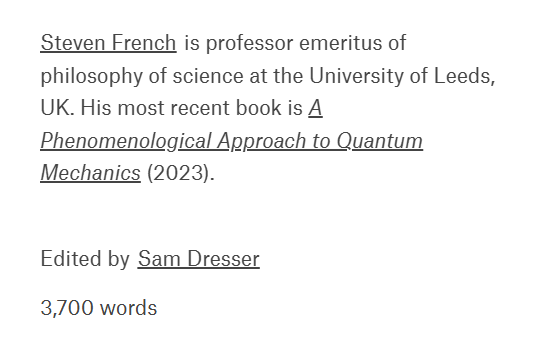Why quantum mechanics needs phenomenology [View all]
 Breaking the chain
The role of the conscious observer has posed a stubborn problem for quantum measurement. Phenomenology offers a solution
https://aeon.co/essays/why-quantum-mechanics-needs-phenomenology
Breaking the chain
The role of the conscious observer has posed a stubborn problem for quantum measurement. Phenomenology offers a solution
https://aeon.co/essays/why-quantum-mechanics-needs-phenomenology
 Photo by Herbert List/Magnum Photos. View from Max Scheler's apartment, 1953. Trastevere, Rome
Photo by Herbert List/Magnum Photos. View from Max Scheler's apartment, 1953. Trastevere, Rome

In the early 1960s, quantum physics was regarded as one of the most successful theories of all time. It explained a wide range of phenomena to an unprecedented level of accuracy, from the structure of atoms and the formation of chemical bonds, to how lasers and superconductors worked. For some, it was more than just a theory, providing an all-encompassing framework for understanding the micro-world of elementary particles. However, it turned out that the very foundations of that entire framework were built on shaky ground – and the person who noticed wasn’t a physicist but an up-and-coming philosopher.
The debate that resulted not only opened the door to new ways of thinking about those foundations, but also had tucked away within it, overlooked by all the participants at the time, an entirely different philosophical perspective on quantum physics – one that can be traced back to the phenomenological philosopher Edmund Husserl. The impact of that shift in perspective is only now being fully appreciated, offering an entirely novel understanding of quantum mechanics, one that prompts a complete re-evaluation of the relationship between philosophy and science as a whole.
The philosopher who kick-started that debate was Hilary Putnam, who went on to make groundbreaking advances in philosophy of language and philosophy of mind, as well as in computer science, logic and mathematics. In 1961, he responded to a paper offering a resolution of the so-called Einstein-Podolsky-Rosen (EPR) paradox, which appeared to show that the description of reality offered by quantum mechanics could not be complete. In the course of his argument, Putnam pointed out that there was an even more profound problem that lay at the very heart of the theory, as it was standardly understood, and which had to do with one of the most basic of all scientific procedures: measurement.
That problem can be set out as follows. A crucial element in the formalism of quantum mechanics is a mathematical device known as the ‘wave function’. This is typically taken to represent the state of a given system – such as an atom or an electron – as a superposition of all its possible states. So, consider an electron and the property known as ‘spin’. (This is not really the same as the spin put on a ball in a game of baseball or cricket, but the name has stuck.) Spin comes in two forms, labelled ‘up’ and ‘down’, and so when we use the wave function to represent the spin state of our electron as it travels towards our detector, it is as a non-classical superposition of spin ‘up’ and spin ‘down’. However, when we come to
measure that spin, the outcome is always one or the other, either ‘up’ or ‘down’, never a superposition of both. How can we account for the transition from that superposition to a definite outcome when we perform a measurement?
snip


